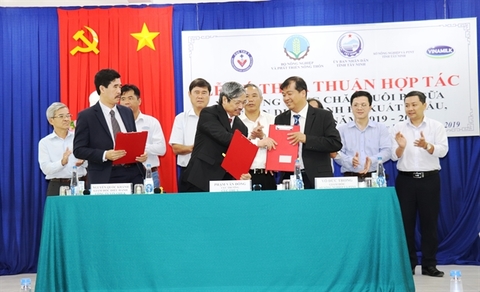
Representatives of Department of Animal Health, Vinamilk and Tay Ninh Province’s Department of Agriculture and Rural Development sign the co-operation agreement. — VNA/VNS Photo Le Duc Hoanh
Tay Ninh Province is getting a safe dairy cow breeding area.
The Department of Animal Health, under the Ministry of Agriculture and Rural Development (MARD), Vietnam Dairy Products Joint Stock Company (Vinamilk) and the provincial Department of Agriculture and Rural Development on Wednesday agreed to build the area over the next three years.
Tran Van Chien, vice chairman of Tay Ninh People’s Committee, said the move aims to prevent diseases, ensure sustainable livestock development, improve product value and provide safe dairy products for domestic consumption and export.
The province has a total 13,353 dairy cows, with the two key breeding areas of Ben Cau District (with 8,000 cows of Vinamilk farm) and Trang Bang District (5,300 cows) producing 29,137 tonnes of milk per year.
Speaking at the deal signing ceremony, Vinamilk’s CEO Nguyen Quoc Khanh said Vinamilk wants to work with localities and State agencies in building safe material areas according to international standards to export Vietnamese dairy products around the world.
Every year, Vinamilk will take samples of toxic residue monitoring under the national programme on monitoring of toxic residues in milk and milk products developed by the Department of Animal Health and submit them to MARD for approval.
Tay Ninh Department of Agriculture and Rural Development is responsible for advising the Provincial People's Committee to set up a steering committee to develop a chain of safe milk production for export; direct professional agencies and local authorities to organise vaccination and monitoring of dairy herd disease in the buffer zone with a radius of 10km around Vinamilk's farm chain according to the technical guidance of the Animal Health Department.
The Department of Animal Health will guide enterprises and localities to organise the production of safe, disease-free milk to meet the standards of the World Veterinary Organisation and the requirements of importing countries. — VNS